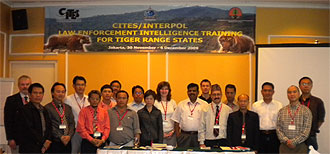|
For use of the media only;
not an official document.
PRESS RELEASE
CITES and INTERPOL joint forces to combat tiger poaching
Geneva/Lyon/Jakarta, 4 December 2009 – A CITES-INTERPOL law enforcement intelligence training for tiger range States was held in Jakarta, from 30 November to 4 December, as part of the joint efforts between the Secretariat for the Convention on International Trade in Endangered Species of Wild Fauna and Flora (CITES) and INTERPOL to boost law enforcement’s worldwide operational capability against the poaching of wild tigers and wildlife crime.
The 5-day course was attended by 16 law enforcement officials from tiger range States, including Bangladesh, Bhutan, Cambodia, China, India, Indonesia, Lao People's Democratic Republic, Malaysia, Nepal, the Russian Federation, Thailand and Viet Nam. Its objective was to facilitate and co-ordinate law enforcement action between wildlife enforcement officers, Customs and police.
 In the early 1900s, tigers roamed throughout Asia and numbered over 100,000. Current estimates indicate that less than 3,500 of these remain in the wild. Tigers are today primarily poached for their skins but almost every part of a tiger’s body can be used for decorative or traditional medicinal purposes. Most tigers are now restricted to small pockets of habitat, with several geographical populations literally teetering on the brink of extinction. In the early 1900s, tigers roamed throughout Asia and numbered over 100,000. Current estimates indicate that less than 3,500 of these remain in the wild. Tigers are today primarily poached for their skins but almost every part of a tiger’s body can be used for decorative or traditional medicinal purposes. Most tigers are now restricted to small pockets of habitat, with several geographical populations literally teetering on the brink of extinction.
With much of the poaching and smuggling ‘highly organized’, David Higgins of INTERPOL’s Environmental Crime Programme said a multi-agency and multi-national response was needed and that co-ordinating this type of response was ‘second-nature’ to INTERPOL.
“This training represents INTERPOL’s commitment to assist the global efforts to conserve wild tigers throughout their range. INTERPOL’s training services and systems and our ability to facilitate international law enforcement co-operation will prove invaluable for the wildlife law enforcement participants from the Tiger range states,” Mr Higgins said.
John Sellar, Chief of Enforcement at CITES said, “This is a marvellous opportunity for the students because raising the awareness of the importance and use of intelligence analysis among tiger range states is essential in equipping their enforcement officials to combat poaching and illegal trade.”
The training, taught by experts from INTERPOL, covers criminal intelligence analysis, a vital police tool widely recognized for providing timely warning of threats and for supporting operational activities and investigations.
In order to acquire relevant and accurate intelligence, information from a variety of sources has to be analysed using structured methods and techniques. Participants will be provided with the knowledge of the modus operandi necessary to carry out operational and strategic analysis with a view to achieving specific investigative aims.
Note to journalists: This press release was originally drafted by INTERPOL and posted on their website on 3 December 2009. For more information about CITES, please contact Juan Carlos Vasquez at +41 22 917 8156 or juan.vasquez@cites.org.
 To read previous press releases, go to Archives. To read previous press releases, go to Archives.
|